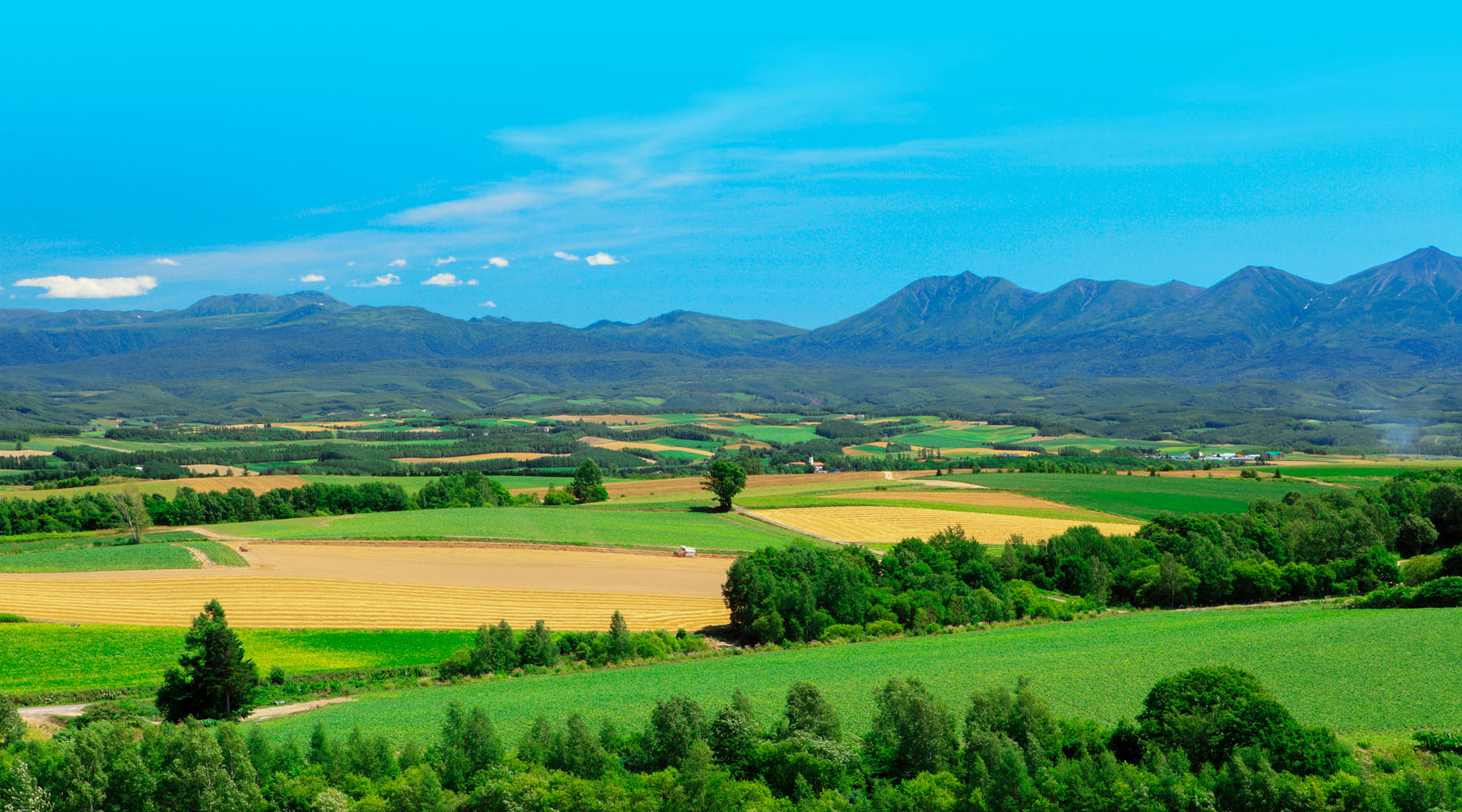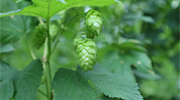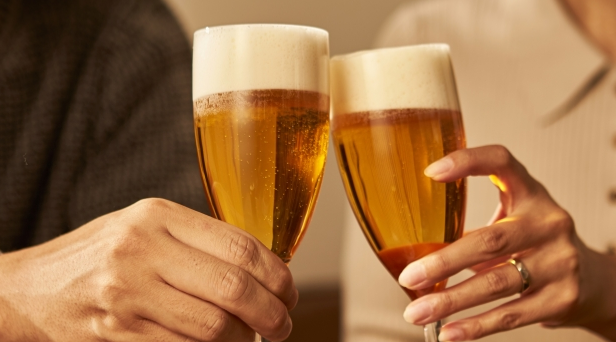Breeding Raw Materials Adapted to Climate Change
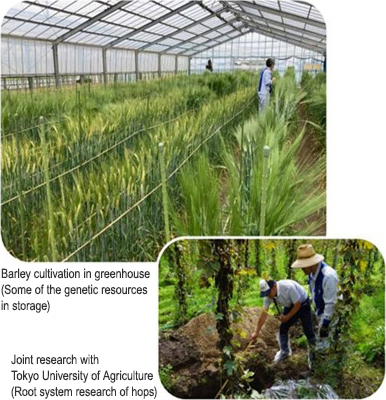
Sapporo Breweries has been engaged in breeding both barley and hops since its establishment. Breeding is an effort to repeat the process of crossbreeding and selection of varieties over a long period of time. By breeding both barley and hops and procuring them through Sapporo Breweries' proprietary raw material procurement system, “collaborative contract farming,” we provide our customers with “good taste” and “safety and security.”
Sapporo Breweries’ hop breeding and research has continued since the days of the Kaitakushi Brewery. One of the results is the “Shinshu Wase” breed, which is an old but high-quality breed and still being planted today. As hops are susceptible to disease and difficult to cultivate, the know-how accumulated through the hop breeding and research is used as guidance to farmers and helps to procure good raw materials through “collaborative contract farming.”
Climate change is triggering an increased risk of agricultural disease, drought, and yield loss associated with extreme weather events. For example, concerns about “ear germination” and “red mold” of barley, which are caused by rainfall at harvest time, are increasing in Hokkaido and other regions. For these issues related to cultivation and quality, Sapporo Breweries aims to solve them by developing high-quality breeds with excellent agronomic qualities based on its breeding knowledge and know-how.
Joint Research and Survey with Tokyo University of Agriculture Okhotsk Campus

In July 2017, Sapporo Holdings signed a comprehensive collaboration agreement with Tokyo University of Agriculture Educational Corporation in order to contribute to solving food and environmental issues on a global scale. We are actively involved in activities that can contribute to the revitalization of food and related industries, as well as international cooperation activities through support for product development. The Sapporo Group is utilizing such industry-academia partnerships to confront the risks posed by climate change and turn those risks into opportunities to ensure safe, secure, high-quality raw material procurement and sustainable production activities. Tokyo University of Agriculture and Sapporo Breweries are currently conducting joint research on the differences in root system development among hop varieties, with the hypothesis that the development of the root system of hops may enhance their ability to adapt to drought and other water stresses.
World's First Discovery of Rain-Resistant, Tasty Barley
Barley, the raw material for beer, sometimes germinates seeds in the field when rainfall increases during the harvest season, and this phenomenon is called “ear germination.” Barley that has been ear germinated can no longer be used as a raw material for beer. On the other hand, increasing the barley's resistance to rain would reduce its quality. Against this backdrop, Sapporo Breweries has discovered the world's first barley that is both resistant to increased rainfall and tastes great when made into beer. We will continue to improve this barley as a new variety and aim to put it to commercial use by 2035.
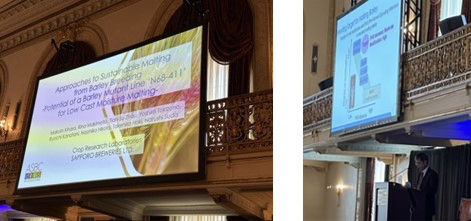
Creation of a Base and Town in Harmony with Nature
Environmental Education through Biotope Gardens
Sapporo Breweries opens the biotope gardens of the Shizuoka and Hokkaido factories to regional families and conducts nature observation events.
The Shizuoka factory conducted family nature observation events from 2010 to 2017 with the cooperation of the local environmental conservation organization “Yakitsube no Sato Forum,” Yaizu Fisheries High School, and the Higashi-mashizu Community Center. The Hokkaido factory receives cooperation from Snow Brand Seed and the Arts & Reports for NATURE in HOKKAIDO for their annual summer vacation waterside creature observation event for families.
The biotope gardens will continue to be enhanced and used as a place to educate local children on the environment.
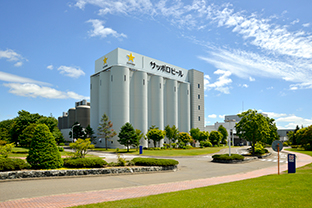
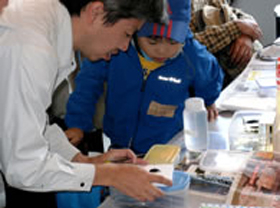
Grape Cultivating Experiences
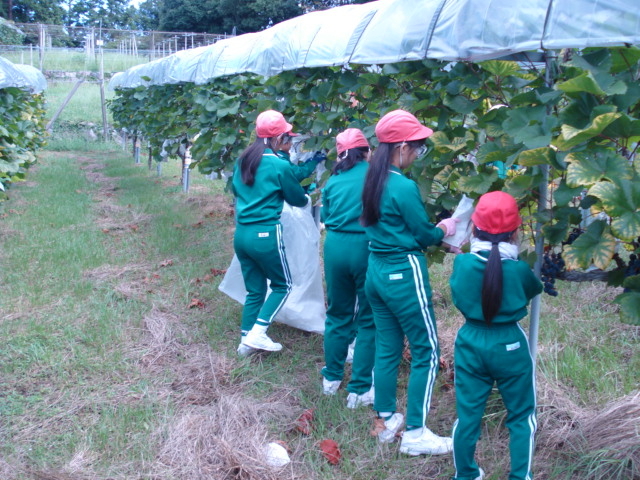
Every year since 2004, Okayama Winery has made part of its grape fields available to the neighboring Karube Elementary School, so that its students can take part in grape cultivation through weeding, bud-picking, flower observation, bagging, and harvesting, alongside winery staff. In this way, Okayama Winery encourages local students to experience the fruits of nature first-hand.
Organizing days and times to carry out the above field work is extremely difficult, as it is greatly influenced both by the weather and by growing conditions, the winery staff enjoy cultivating grapes with the students every year.
Preservation of Endangered Species
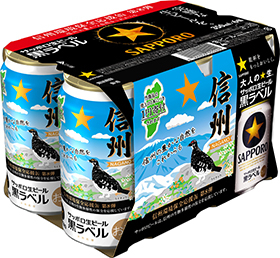
On May 31, 2017, Sapporo Breweries and Nagano Prefecture have entered the “Biodiversity Protection Partnership Agreement” which aims to popularize and enhance protection of the endangered “Raicho” snow grouse.
Furthermore, the Sapporo Draft Beer Black Label’s “Shinshu Environmental Support Can” was released in Nagano Prefecture eight times in limited quantities in December 2016, June 2017, December 2017, June 2018, July 2019, November 2020, October 2021, and October 2022.
The fourth installation of this series will be launched in June 2018*, and will feature a QR code for Furusato Shinshu Donations (Hometown Tax) on the product label.
Part of these sales will be donated to support Nagano Prefecture’s activities toward environmental conservation.
*The Basic Environment Law has designated June 5 as “Environment Day,” and the month of June as “Environment Month” for advocation of environmental conservation activities, and Nagano Prefecture also develops prefecture-wide environmental conservation activities.
Initiatives to promote coexistence with nature focusing on urban farming
Sapporo Real Estate has been working on urban development initiatives focusing on "urban farming" since 2019. Until recently, we used mobile planters for simple initiatives; however, in August 2020, we opened the "Yebisu Garden Farm," a community farm where we can "grow together with the town" inside Sapporo Plaza.
Together with our partner organization, the NPO Urban Farmers Club, we are working to create various opportunities for interaction with nature and community building in the Ebisu area, using urban farming as a starting point. The fundamental aim of this project is to raise awareness of the importance of coexistence with nature among local residents in the urban environment of Ebisu.
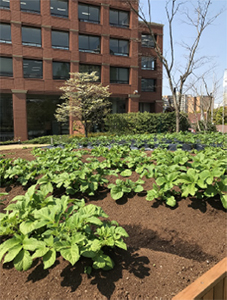
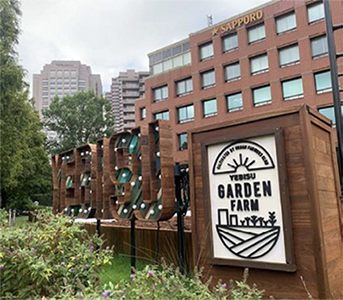
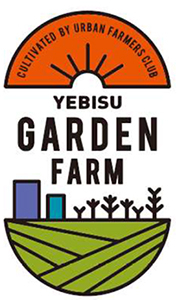
Reuse of Sapporo's winter tradition "Jumbo Christmas Tree"
The "Jumbo Christmas Tree," which is displayed every year at Sapporo Factory, is a Japanese Hemlock donated from the thriving forestry town of Hiroo-cho in eastern Hokkaido since the year of the facility's opening. The displayed tree is reused for a "woodworking" workshop promoting the nurturing of trees following the Christmas season. It is processed into Christmas ornaments, and participants color them and take them home to decorate. The participation fee is donated to the tree-planting activities in Hiroo-cho.
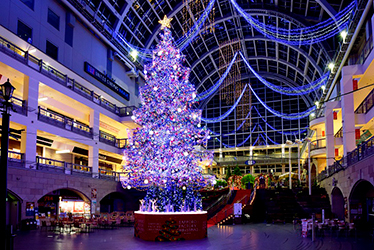
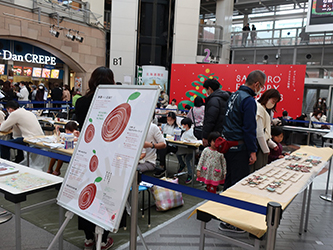
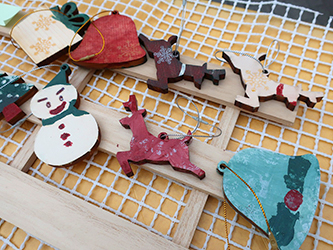
Activities for forest conservation


Hiyama Promotion Bureau
In May 2008, Sapporo Breweries and the Hokkaido Forest and Greenery Association Hiyama Branch signed an “Agreement for Forest Development Activities” and have cooperated with seven towns in the region, including Otobe Town and Esashi Town. Under the agreement, the two parties planted Aomori cypress trees as part of the “Forest Development of Hiyama” initiative to restore the homeland forests. These activities were carried out in Esashi Town in 2023.
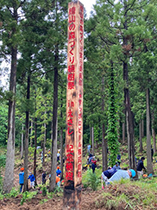
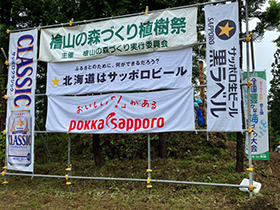
Cooperative campaigns with our customers
Sapporo Breweries, CO-OP Sapporo, and Hokkaido Prefecture have carried out a campaign to “Reenergize the Forests of Hokkaido!” since 2013. Under this campaign, for every bottle of eligible products purchased by customers, the companies offset 1 yen, equivalent to about 100 grams of CO2 (10 yen, equivalent to about 1,000 grams of CO2, for each bottle of wine).
As a result of this initiative, in 2023, 2.58 million yen was donated to forest conservation activities in Hokkaido, and 100,000 yen from a portion of the sales was donated to the CO-OP Future Forest Fund.
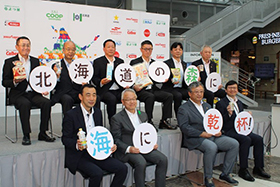
Forest Conservation with CartoCans
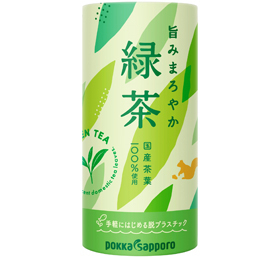
POKKA SAPPORO Food & Beverage uses paper beverage containers that are made up of 30% or more domestic materials, including thinned wood generated through forest conservation and cultivation. Along with using Japanese wood resources, a part of product sales is donated to the “Green Fund” to aid, protect and grow Japanese forests. The growth and protection of healthy forests promotes CO2 absorption, which prevents the greenhouse effect, and also supports ecosystem conservation for living things in the forest to conserve our rich national land.
Restoration of Abandoned Farmland into Lemon Orchards
Pokka Sapporo, which is engaged in lemon farming in Osaki-kamijima-cho (Toyota-gun, Hiroshima Prefecture), is taking over farmland without successors and restoring abandoned farmland with the aim of promoting lemon production.


Company Volunteer Activities
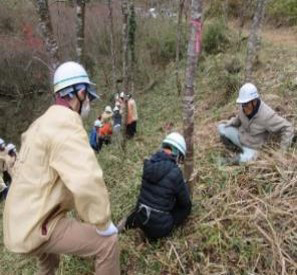
Sapporo Breweries' Kyushu-hita factory is the first corporation to participate in the “Company Participation Forest Development” program in 2002, promoted by Oita Prefecture. With this program, general forest conservation activities with the Takase Forestry Association has been launched at their woodlands, which includes undergrowth cutting, pruning and improvement cutting activities. After the initial participation duration of five years ended, activities continued as the “Hita-Takase Forest Supporters” corporate volunteers for forest conservation, to realize the factory concept of “co-existence with the environment (harmony with nature)” and “co-existence with local citizens.” Employees from the Kyushu-hita factory participate in making bamboo lanterns and lighting lanterns to coexist with the local community and preserve the environment.
Conservation of Country-Side Forests
The Kyushu-hita factory is the first corporation to participate in the “Company Participation Forest Development” program in 2002, promoted by Oita Prefecture. With this program, general forest conservation activities with the Takase Forestry Association has been launched at their woodlands, which includes undergrowth cutting, pruning and improvement cutting activities. After the initial participation duration of five years ended, activities continued as the “Hita-Takase Forest Supporters” corporate volunteers for forest conservation, to realize the factory concept of “co-existence with the environment (harmony with nature)” and “co-existence with local citizens.” Employees from the Kyushu-hita factory participate in making bamboo lanterns and lighting lanterns to coexist with the local community and preserve the environment.
Local Environmental Preservation Activities through Cleanups
Each operating company of the Sapporo Group conducts cleanup activities around its offices, plants, and stores. They also participate in local river and shopping district cleanups. These efforts are introduced in PIRICA, a social networking service for picking up trash. The Group will continue to express its daily gratitude to the communities and contribute to them through environmental preservation and social contribution activities.
Major Regional Beautification Activities
| Hokkaido | Eniwa City | Participation in “Eniwa City Clean Walking” |
|---|---|---|
| Tochigi | Nasu Town | Extermination activities for the foreign species cutleaf coneflower (Rudbeckia laciniata) |
| Fukuoka | Fukuoka City | Participation in “Love Earth Clean-up Fukuoka” |
| Tokyo | Shibuya Ward | Participation in Yebisu/Hiroo/East region cleaning activities |
| Shizuoka | Shizuoka City | Participation in the “Clean Town Campaign” |
| Chiba | Funabashi City | Participation in “Funabashi Sambanze Clean-up” |
| Shizuoka | Yaizu City | Participation in “Yaizu Brach Clean-up Campaign” |
Factory Participation in Adoption Programs
| Sapporo Breweries Sendai factory |
Miyagi Smile River Program |
|---|---|
| Sapporo Breweries Shizuoka factory |
Shizuoka Adopt Road Program |
| Sapporo Breweries Kyushu-hita factory |
Waterside District Clean-up Institution |
| Sapporo Breweries Okayama Winery |
Promotion operation for “Okayama Adopt” |
| POKKA SAPPORO Nagoya factory |
Adopt program at a public facility in Kitanagoya City |
| POKKA SAPPORO Gunma factory |
Isezaki City adopt program |
| POKKA SAPPORO Sendai factory |
Miyagi Smile River Program |
- Biodiversity Protection Guidelines
-
Breeding Raw Materials Adapted to Climate Change



